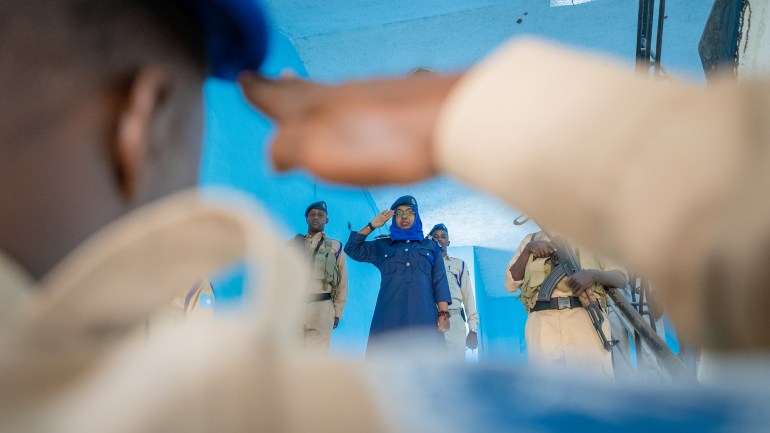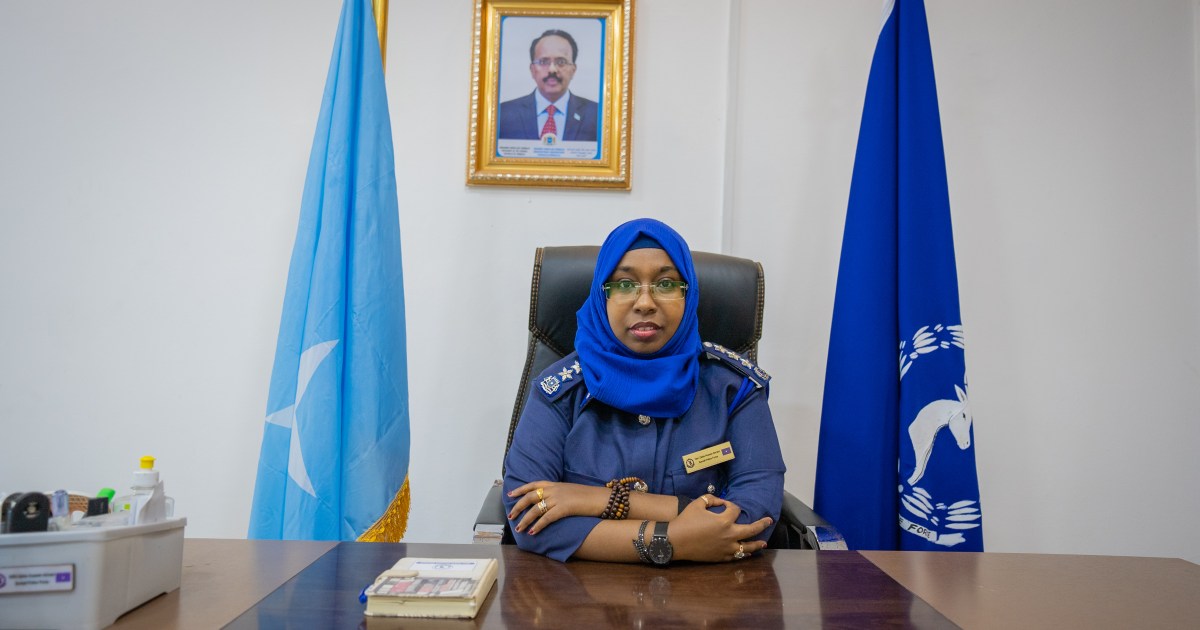The Somali general fighting al-Shabab and the patriarchy
When Zakia Hussen Ahmed attended her first meeting in the Somali police force as a director of community policing, a junior male officer asked her to “get up and fetch some tea” for him assuming that the 29-year-old was a secretary to one of the senior officers, since she was not in her uniform.
She decided to use the incident as an opportunity to give a lesson. “I realised whatever step I take next would determine how the rest of the team and senior officers would view me,” Hussen, now 38, said.
So, she calmly commanded the junior officer – who was shocked as another officer told him she was the new director – to fetch his own tea and bring her a cup too. “He not only got up to give a salute but also went out to fetch his own tea plus an extra cup for me as ordered,” she said.
In Somalia’s male-dominated security forces, such condescension is a regular encounter for the few female officers. According to Hussen, Somalia has a 14,000-strong police force. Only a tenth of that figure is women, even though a number of younger female officers have joined the force in the last 10 years, serving in various capacities nationwide.
Since 1991, when President Mohamed Siad Barre – who had held power since being enthroned by a bloodless coup in 1969 – was overthrown, sparking a prolonged conflict between clan strongmen, religious hardline groups and other rival factions, Somalia has been plagued by lawlessness. After a series of fragile reconciliation deals, a United Nations-backed federal government was endorsed in 2012, which handed power to the current administration in 2017.
As Somalia’s post-conflict state-building journey continues to make slow but steady progress, every little effort to revive the collapsed institutions counts significantly. Members of the diaspora like Hussen who have returned home, are fiercely committed to accelerating that progress.
 General Zakia Hussen takes a salute from officers while on duty. [File: Mohamud Utaama]
General Zakia Hussen takes a salute from officers while on duty. [File: Mohamud Utaama]From her first day in the police force, she says she decided that bold actions and courage would be the guiding principles to navigate a patriarchal institution serving in a deeply conservative society.
In the following five years after her role in charge of community policing, Hussen worked in various agencies, including the Criminal Investigation Unit, the Intelligence Agency and the office of the Chief Justice. Most of her work focused on reform, institutional building and police relations with the public.
In August 2018, Hussen was promoted to brigadier general and appointed as the deputy police commissioner, becoming the first woman to ever achieve the rank in the history of Somalia’s security forces.
Somalia: Zakia Hussein Ahmed, the first woman promoted to the rank of general gets her stars from @SomaliPM at the Police HQs. She was recently appointed as the deputy commander of the Somali police forces. pic.twitter.com/I3PHaW3guo
— Harun Maruf (@HarunMaruf) August 26, 2018
‘An undisputed example’
Hussen was only six years old when her family fled the civil war and settled in the southern city of Eslöv, Sweden. There, she spent most of her teenage life before moving to the United Kingdom where she became actively involved in London’s vibrant Somali community.
In 2005, while studying international relations at the London Metropolitan University, she served as vice president of the Islamic Society, helping to tackle Islamophobia and bring diverse groups together. After graduating, she joined Hanoolaato, a diaspora-led sociopolitical movement that advocates for peace and development in Somalia.
“I vividly recall my first impression of Zakia when I saw her give a speech at a diaspora event in the UK around 2010-11,” said Abdi Barud, former adviser to the Somali prime minister. “Her speech was full of wisdom and inspiring and I knew right then that she would go far.”
Years later, when Hussen became deputy police chief, Barud worked with her to modernise the police department’s communications department – introducing regular media briefings and a publicly accessible helpline for the first time, among other reforms.
“I think General Zakia is an undisputed example that the ‘glass ceiling’ [for women] is breakable with a supportive network, self-determination and hard work,” he said.
It was Hussen’s work with the diaspora movement that inspired her to return to Somalia in 2012 to play a role in the reconstruction of the Horn of Africa country. But it was not an easy decision.
“Going back to a place you left at six for the first time, without your parents and not having any other family member was extremely challenging,” she said. “But I know I have their blessings and prayers and that is the greatest fuel to my fire.”
In late 2012, Hussen first began working in the capital Mogadishu with the Heritage Institute think-tank as a programme manager. In that role, she engaged with civil society organisations and government institutions, including the police force which she would eventually join a year later.
Everyone, including her parents, objected or outrightly disapproved of that decision to enlist in the police. Even her mentors warned of the dangers of joining a security outfit tackling one of Africa’s deadliest violent groups.
Not long after she joined the force, al-Shabab, the al-Qaeda-linked armed group seeking to unseat the Somali federal government, began sending her death threats.
The threats intensified when she became deputy police chief. Landmines and other attempts failed, she said, including a car bomb that exploded a day after she travelled to London.
“As a commander, young and female [from the diaspora], I am the personification of everything they stand against,” said Hussen. “At one point, I had to leave the country for a couple of days as the imminent threat against my life was very strong.”
Rather than backing down, the general has become the face of the Somali police force, which has been struggling to build public trust following longstanding allegations of abuse, corruption, rape and exploitation.
“Putting the community at the heart of policing has been a key approach to my work and I believe it is the key to defeating terrorism,” she said. The crime reporting hotline and other programmes she instituted are bringing the police in direct communication with the communities they serve.
Hussen is also passionate about fighting deeply rooted stereotypes against women in Somalia on a daily basis “mainly trying to change the attitudes towards female leadership in Somalia”.
As the highest-ranking female officer ever in Somalia, the general is seen as a role model not just for the women in the force but the entire female population. In 2021, she established the first all-female armed special forces unit, which she has said is one of her greatest achievements.
For the first time in #Somalia history we have an all female special forces unit!
Thanks to @TC_Mogadishu for the realisation of a long time dreamWaa markii ugu horeeysay Somalia yeelato koox wada gabdha ah kana tirsan ciidamada sida gaarka ah u tababaran. @SomaliPM pic.twitter.com/xgE3MmofeS
— Zakia Hussen (@ZakiaHussen) July 12, 2021
The 50 members of the all-female unit, all between the ages of 25 and 30, were trained in Turkey. They have been integrated into the Haramcad (Somali word for cheetah) Special Police Forces, also trained by Turkish forces as part of its geostrategic assistance to Somalia. Together, they carry out special operations and provide day-to-day support to other police units in the capital.
“They serve as part of our counterterrorism police brigade, conducting raids and operations against al-Shabab cells alongside their male counterparts,” she said.
In February 2019, she led a significant operation as the only female in a special squad. It was her first major operation as a deputy chief and a complex hostage situation during an al-Shabab attack in central Mogadishu.
After a gun battle that lasted all night, the security forces saved 45 civilians trapped in that attack but lost 11 officers. The pain of losing her colleagues hit Hussen hard and made her “feel sick to my stomach”.
The following morning, she received a call from the president who thanked her for her bravery and coolheadedness. “As I hung up the phone,” she said. “I realised this is what it means to be Somalia’s most powerful woman; pure pain, pure pride.”




